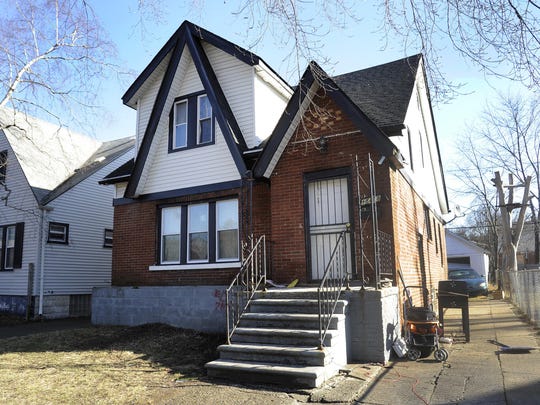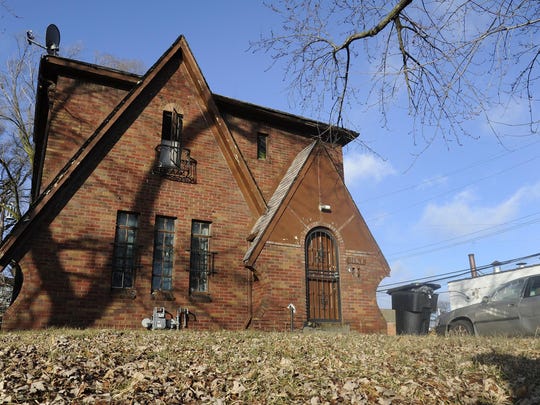BY Joel Kurth, The Detroit News (2/29/2016).
It seemed like a sweet ticket to the American dream for Douglas Todd.
Put $1,400 down, make monthly payments of $400 and own a house within five years. So he told his daughter, who also agreed to buy a home in northwest Detroit last year for similar terms. Now, after seven months and $5,000 in payments and renovations, Todd isn’t any closer to owning the brick house in northwest Detroit.
In fact, both he and his daughter could soon lose their homes. Todd is amid a protracted legal fight that’s involved four eviction hearings since January. His daughter, Jessica Todd, faces tax foreclosure next month.
“I wanted a house to leave to my grandkids instead of renting for all these years and having nothing to show for it,” said Todd, 53, a laborer who cleans steel mills. “I wish I never would have signed it.”
Welcome to the murky world of land contracts and similar private-party home financing such as lease to own. Largely unregulated, land contracts and similar deals have soared in Detroit since the mortgage meltdown, attorneys and housing advocates say, contributing to evictions in a city that leads the nation in them.
Last year, there were more land contracts than home mortgages in Detroit: 2,177 to 2,023, according to records from Wayne County and RealtyTrac, a California-based real estate data company. The numbers are likely far higher, experts say, because there’s no requirement the contracts be publicly filed.
Macomb and Oakland counties each recorded about 750 land contracts last year.
Land contracts don’t cause as many problems there as ones in Detroit, which often involve ramshackle homes purchased from tax foreclosure auctions and contracts that are “written to fail,” contended Joon Sung, deputy chief counsel of Michigan Legal Aid and Defender Association, a nonprofit that represents the needy in court.
“People are often overjoyed at the prospects of owning their own home, so they go in blind and fall into a trap,” Sung said.

After seven months and $5,000 in payments and renovations, Douglas Todd isn’t any closer to owning this house in northwest Detroit. There have been four eviction hearings since January. (Photo: Jose Juarez)
Home sellers argue the land contracts — which often involve trial periods when buyers are treated as renters — benefit all parties.
Poor people get a shot at home ownership for about $400 a month, half the rental rate for city homes. And sellers don’t have to worry about upkeep, said Mohamad Bazzi, president of New Renaissance Property Management of Detroit.
“It’s better than having a squatter,” he said. “It relieves us of rehabbing and the maintenance of these homes and puts that all on the tenant. It gives them the chance to buy a home if they put in enough sweat equity.”
New Renaissance is one of a handful of well-known bulk buyers that buy tax-foreclosed homes to sell on land contracts. In years past, the company has bought about 200 per year, said Bazzi, who spoke to The Detroit News before an eviction hearing in 36th District Court for one of his tenants.
He described most as “shells,” empty homes with little more than four walls and a roof.
The homes are sold “as-is” — usually lacking furnaces, hot water heaters and pipes — and most wouldn’t pass inspections required of rentals or through traditional mortgages, Sung said.
For Douglas Todd, that means heating his home with space heaters and a gas stove because it lacks a furnace.
For Jessica Todd, it means rarely entering her home on Prairie near McNichols, which also lacks a furnace. It has a feral cat in the basement, broken windows and a pile of garbage on the second floor.
She signed a land contract agreeing to buy it, over time, for $32,000.
Unlivable house
“I don’t let my kids sleep here,” said Jessica Todd, 24, who has four children and lives on disability. “I only come around late at night to make sure no one steals the hot water heater.”
Instead, the family has spent much of the winter sleeping at the homes of friends and relatives or in motels, she said.
Cindy Wilde, an agent for Detroit Property Exchange that sold the Todds the homes, said buyers know what they’re getting into. The company buys and sells about 600 tax foreclosed homes in Detroit each year and “99.9 percent” are financed with land contracts, she said.

Douglas Todd (Photo: .)
“It’s better than renting because it’s going to be yours at the end,” she said.
“If people make payments on time, like they’re told — like Mr. Todd was told — you won’t have any problem.”
Detroit Property Exchange is an affiliate company of Mike Kelly, a Grosse Pointe Woods investor who is one of Detroit’s biggest bulk land buyers.
Property records show Douglas Todd’s home on Cruse near Fenkell has changed ownership repeatedly in the past two years.
A company affiliated with Detroit Property Exchange, Frenchy Sirois of Melvindale, lost it to foreclosure in 2014 over $11,200 in unpaid taxes.
That year, Wayne County sold it at auction for $833 to Chase Loan Services, a Detroit company incorporated by Kelly.
Last year, Frenchy Sirois filed papers in Wayne County indicating it was selling the house to Todd on a land contract for $15,900.
The way the contract is written, Douglas Todd agreed to be a renter for four months before the land contract kicked in.
It never did.
He was late with a payment in December after buying and installing sinks, toilets and pipes for the house. That month, he also received the house’s water bill. It was for $12,000.
“If all along, I’m leasing, why should I be the one responsible for fixing all this myself?” Todd asked.
The eviction case against him was dismissed Feb. 17 after a lawyer for Detroit Property Exchange admitted in court he wasn’t sure which company owns the house.
Even so, more filings are likely soon from both sides in the case over the contract and Todd’s right to stay, attorneys said.
$6,000 tax bill
Todd’s daughter also was served with eviction papers in December. She said she stopped making payments when she received a $6,000 bill for back taxes and her monthly payment jumped to $550 from $400.
The year before, the house’s previous occupant was also evicted, property records show.
He also was on a land contract.
As Jessica Todd’s case moved through court, Detroit Property Exchange agreed to sell her the house outright for $5,000.
She came up with the money in mid-February, thanks to a no-interest loan from a nonprofit, United Community Housing Coalition.
Another big bill is looming. The house is set to go into tax foreclosure in March, county records show. Her attorney, Joe McGuire, said she hopes to save the home by entering into a payment plan soon.
Cylenthia LaToye Miller, one of four 36th District Court judges in Detroit assigned to handle evictions, said she’s increasingly seeing the lease-to-own land contracts go bad.
Before noon on a recent Friday, Miller handled four eviction cases involving deals similar to the Todds.
She handled Douglas Todd’s case and repeatedly expressed frustration over the arrangement. She said the state Legislature “might want to take a look at” lease-to-own land contracts, arguing they may violate state law by forcing renters to live in uninhabitable homes.
“They have become popular but they are problematic to say the least,” Miller said.

After $5,000 in payments and renovations, Douglas Todd isn’t any closer to owning this Detroit house. (Photo: Jose Juarez)
Wilde described the four months of leasing as a “trial period” to ensure buyers are ready for home ownership. There’s also a benefit for sellers, she acknowledged.
“It’s easier to evict them on a lease than on a land contract,” she said.
Under Michigan law, the soonest landlords can evict renters for nonpayment is one month; it takes four months to do so with land contracts, said McGuire, a lawyer who handles eviction cases and also represents Douglas Todd.
“Everyone knows what is going on. People are gaming the system,” said McGuire of the nonprofit Michigan Legal Services. “People who enter these contracts end up paying a whole lot more than they would by renting. But have nothing to show for it.”
Records don’t reveal how many of the 37,000 landlord-tenant cases in Detroit each year involve land contracts. The most recent census figures indicate no other city in the nation has more evictions.
Wilde estimated only 2 percent of Detroit Property Exchange’s deals end in eviction. She didn’t take The News up on its offer to interview a satisfied client.
Bazzi said 70 percent of his buyers keep up with payments.
“The hard part is convincing people to really fix the properties,” Bazzi said. “Are they going to dig up all the pipes in the backyard and replace them? That’s where they fail.”
JKurth@detroitnews.com
Twitter: @joeltkurthSupport Local Journalists and the Stories They Tell$2.99 / weekSubscribe NowCONNECTTWEETLINKEDINCOMMENTEMAILMORESponsored LinksYou May LikeThe One Thing Every Cat Owner Should Add To Their Cat FoodUltimate Pet Nutritionby Taboola
MORE STORIES
- Shirkey: New revenue needed for Michigan’s roadsFeb. 13, 2019, 1:27 p.m.
- Winter weather advisory extended to 4 p.m.Feb. 13, 2019, 12:42 p.m.
- Whitmer wants ‘hands-free’ cell law for driversFeb. 13, 2019, 10:54 a.m.
- Woman, 29, dies after Milford car crashFeb. 13, 2019, 10:50 a.m.
- Murder defendant briefly escapes from courtFeb. 13, 2019, 11:25 a.m.
- Duggan pushes auto insurance rate cutsFeb. 13, 2019, 12:07 p.m.